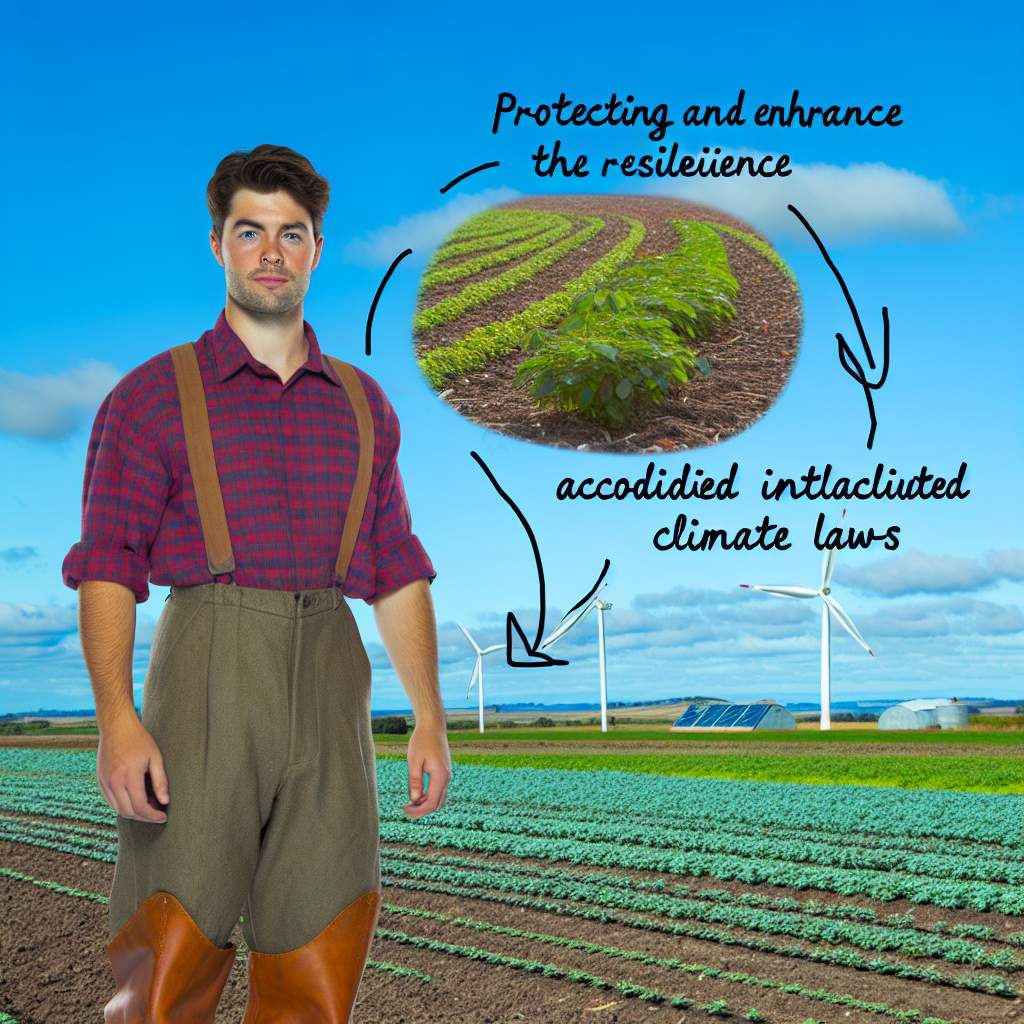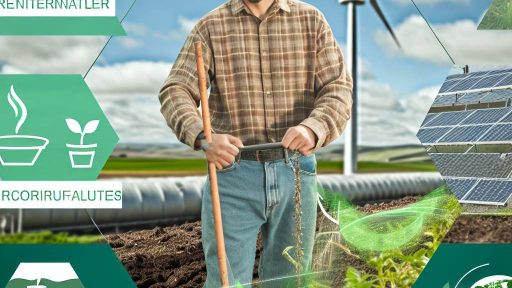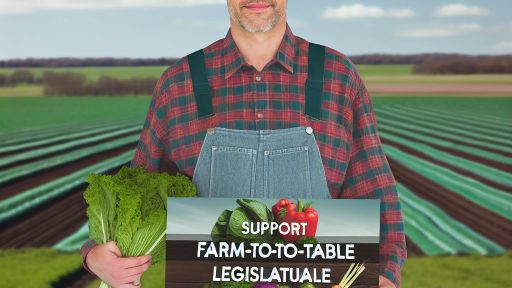Introduction to Climate Laws
Definition of Climate Laws
Climate laws refer to regulations aimed at mitigating climate change.
These laws guide actions to reduce greenhouse gas emissions.
They often set targets for renewable energy and emissions reductions.
Furthermore, climate laws encourage sustainable agricultural practices.
Importance for Agriculture
Agriculture plays a critical role in both the economy and the environment.
Climate laws can significantly enhance agricultural resilience.
They create frameworks for adapting farming practices to changing climates.
Moreover, these laws help farmers cope with extreme weather conditions.
Support for Sustainable Practices
Climate laws promote the adoption of sustainable agricultural techniques.
For example, they incentivize organic farming and water conservation.
Farmers can receive assistance for implementing eco-friendly technologies.
This fosters a healthier ecosystem and improves soil fertility.
Encouraging Innovation
Climate laws also stimulate innovation in agricultural practices.
They encourage research into drought-resistant crops and resilient farming strategies.
Additionally, new technologies can help minimize resource usage.
Transform Your Agribusiness
Unlock your farm's potential with expert advice tailored to your needs. Get actionable steps that drive real results.
Get StartedOverall, innovation leads to more sustainable and productive farming.
Current Climate Challenges Faced by Farmers: An Overview
Increasing Weather Variability
Farmers are witnessing unpredictable weather patterns.
These fluctuations impact crop yields significantly.
Consequently, they must adapt to changing conditions quickly.
Soil Degradation
Soil health is deteriorating in many regions.
Factors like erosion and nutrient depletion play a major role.
This reduces the land’s capacity to support crops.
Water Scarcity
Access to fresh water is becoming increasingly limited.
In many areas, drought conditions are prevalent.
Farmers struggle to irrigate their crops effectively.
Pest and Disease Outbreaks
Climate change shifts pest habitats and behaviors.
Farmers face new challenges from emerging pests and diseases.
These factors threaten crop health and productivity.
Economic Uncertainty
Climate variability leaves farmers financially vulnerable.
Market prices fluctuate alongside changing agricultural outputs.
As a result, farmers face unpredictable income streams.
Policy and Regulatory Challenges
Adapting to new environmental regulations can be difficult.
Farmers often find themselves navigating complex laws.
Such challenges hinder their ability to implement necessary changes.
How Climate Laws Foster Sustainable Farming Practices
Promoting Conservation Techniques
Climate laws encourage farmers to adopt conservation techniques.
These techniques protect soil health and water quality.
For instance, crop rotation reduces soil depletion.
Additionally, cover cropping minimizes erosion.
Overall, these practices enhance agricultural resilience.
Showcase Your Farming Business
Publish your professional farming services profile on our blog for a one-time fee of $200 and reach a dedicated audience of farmers and agribusiness owners.
Publish Your ProfileIncentivizing Renewable Energy Use
Legislation often includes incentives for renewable energy use.
Farmers can harness solar, wind, and biomass energy.
These energy sources lower greenhouse gas emissions.
Moreover, they can decrease energy costs for farms.
Consequently, farmers boost their economic sustainability.
Encouraging Research and Innovation
Climate initiatives frequently fund research related to agriculture.
New technologies improve crop yields while reducing inputs.
Farmers can access innovative solutions through grants.
This financing aids in adapting to climate challenges.
As a result, sustainable farming methods continue to evolve.
Supporting Local Food Systems
Climate laws often support local food systems.
Strengthening local markets reduces transportation emissions.
Farmers benefit from closer connections to consumers.
This support enhances community resilience and food security.
Consequently, local economies thrive and reduce carbon footprints.
Enhancing Environmental Stewardship
Regulations promote environmental stewardship among farmers.
Farmers are encouraged to implement eco-friendly practices.
Such practices protect biodiversity and ecosystems.
Additionally, they help mitigate climate change impacts.
Ultimately, this fosters a sustainable farming culture.
Uncover the Details: Applying for Bioenergy Incentives in Sustainable Farming
Case Studies: Successful Implementation of Climate Laws in Agriculture
Adaptive Farming Techniques in California
California adopted climate laws promoting adaptive farming techniques.
Farmers like Maria Gonzalez embraced water-efficient practices.
This helped reduce water usage during drought periods.
Additionally, these techniques enhanced crop yields and resilience.
Moreover, farmers received state incentives for sustainable practices.
The state provided access to training on climate adaptation strategies.
Innovative Crop Rotation in the Midwest
The Midwest implemented climate legislation encouraging crop rotation.
Farmers such as James Miller adopted diverse crops to improve soil health.
This practice reduced pest infestations and enhanced biodiversity.
Subsequently, farmers noticed increased resistance to climate variations.
Furthermore, crop rotation practices received financial support from the government.
This support motivated many farmers to shift their traditional practices.
Renewable Energy Solutions in New York
New York State introduced policies promoting renewable energy in agriculture.
Farm operations like Green Valley Farms integrated solar panels effectively.
These installations decreased energy costs significantly for producers.
Additionally, it supported local economies by creating green jobs.
Farmers reported improved sustainability through reduced carbon footprints.
Consequently, state incentives made these technologies affordable.
Community-Based Initiatives in Oregon
Oregon’s community initiatives encouraged farmers to collaborate on climate action.
Showcase Your Farming Business
Publish your professional farming services profile on our blog for a one-time fee of $200 and reach a dedicated audience of farmers and agribusiness owners.
Publish Your ProfileFarmers formed cooperatives focusing on sustainable resource management.
For instance, they shared techniques for soil conservation and water retention.
These cooperatives fostered innovation and knowledge sharing among members.
Moreover, they became platforms for influencing state climate policies.
As a result, collective efforts led to measurable improvements in resilience.
Discover More: Strategies For Farmers To Benefit From Trade Agreements
The Role of Technology in Complying with Climate Regulations
Integrating Advanced Technologies
Farmers are increasingly adopting advanced technologies to meet climate regulations.
These innovations include precision agriculture and smart irrigation systems.
Furthermore, utilizing drones for monitoring can enhance decision-making processes.
Data analytics provide insights into crop performance and resource usage.
Automation and Sustainable Practices
Automation streamlines farming practices, reducing waste and improving efficiency.
For instance, robotic systems can handle tedious tasks such as planting and weeding.
This technology minimizes resource use while adhering to environmental regulations.
Monitoring and Reporting Tools
Farmers need accurate monitoring tools to track compliance with regulations.
Remote sensing technology offers real-time data about soil conditions and weather patterns.
Additionally, software solutions can help farms maintain compliance records efficiently.
These tools simplify the reporting process required by regulatory bodies.
Investing in Renewable Energy
Many farms are investing in renewable energy sources for sustainability.
Solar panels and wind turbines reduce greenhouse gas emissions significantly.
Moreover, such investments can lower operational costs in the long run.
Collaboration and Knowledge Sharing
Collaboration among farmers enhances the sharing of best practices.
Networks and forums facilitate discussions about emerging technologies.
Sharing experiences leads to collective problem-solving in compliance challenges.
Discover More: Benefits Of Integrated Pest Management Strategies

Economic Incentives for Farmers Under Climate Laws
Understanding Grants and Subsidies
Grants provide essential funding for farmers to adapt to climate change.
Many programs target sustainable agricultural practices.
Subsidies reduce the cost of adopting climate-friendly technologies.
These incentives help farmers improve resilience effectively.
Types of Grants Available
Various grants support environmental initiatives on farms.
The USDA offers funds specifically for conservation projects.
Regional programs also provide financial assistance tailored to local needs.
Moreover, non-profit organizations often fund innovative farming solutions.
Benefits of Subsidies
Subsidies make advanced equipment more accessible for farmers.
They encourage investment in renewable energy sources on farms.
Farmers can also receive assistance for sustainable land management practices.
Overall, subsidies boost farm productivity in a changing climate.
Application Process for Funding
Applying for grants requires careful preparation of proposals.
Farmers must demonstrate the potential impact of their projects.
Additionally, maintaining clear records aids in the application process.
Understanding the eligibility criteria is crucial for success.
Showcase Your Farming Business
Publish your professional farming services profile on our blog for a one-time fee of $200 and reach a dedicated audience of farmers and agribusiness owners.
Publish Your ProfileSuccess Stories
Many farmers have thrived by utilizing available grants and subsidies.
For instance, Anna’s Organic Farm reduced costs through renewable energy subsidies.
Similarly, Green Valley Farms received grants for water conservation measures.
These examples illustrate the tangible benefits of financial support.
Explore Further: Complying With Import Export Regulations In Modern Farming
Community Engagement: Involving Farmers in Climate Law Development
The Importance of Farmer Participation
Farmers hold valuable insights about their land and environment.
Active involvement fosters trust between lawmakers and agricultural communities.
Engagement allows farmers to voice their unique challenges and needs.
Moreover, their participation can shape more effective climate laws.
Methods for Engaging Farmers
Organizing workshops creates opportunities for farmers to share their perspectives.
These events can encourage open discussions about climate-related issues.
Surveys can also gather broader input from the farming community.
Furthermore, utilizing online platforms expands outreach and participation.
Collaborative Decision-Making
Involving farmers in the decision-making process leads to better outcomes.
Collaboration ensures that laws reflect real-world agricultural practices.
This approach can enhance the practical applicability of proposed policies.
In turn, it promotes sustainable farming practices aligned with climate goals.
Case Studies of Successful Engagement
In California, farmers participated in developing water conservation laws.
Their experience helped create tailored regulations that are widely accepted.
Similarly, in New Zealand, farmers contributed to national climate policies.
Such case studies illustrate the effectiveness of community engagement.
Building a Supportive Network
Creating networks among farmers enhances their collective voice.
Support groups can share knowledge and resources related to climate laws.
This synergy strengthens advocacy efforts for better policies.
Ultimately, collaborative networks empower farmers in climate discussions.
Future Trends: Anticipating Changes in Climate Legislation and Their Impact on Farming
The Shift Towards Stricter Regulations
Governments are increasingly adopting stricter climate regulations.
Farmers must adapt to comply with these new requirements.
This shift could lead to higher operational costs for farms.
Moreover, it may require significant investments in technology.
Nevertheless, adaptation could enhance long-term sustainability.
Incentives for Sustainable Practices
New legislation often includes incentives for adopting sustainable practices.
These incentives could motivate farmers to implement eco-friendly methods.
Examples include financial grants and subsidized equipment costs.
Farmers could benefit from tax deductions for green initiatives.
Such measures encourage the transition to sustainable agriculture.
Impacts on Crop Selection
Climate laws will influence crop selection across various regions.
This change is driven by shifts in growing conditions and seasons.
Farmers might need to consider drought-resistant or flood-tolerant crops.
Consequently, altering crop diversity may enhance resilience.
Adaptive crop management will be key in this evolving landscape.
Showcase Your Farming Business
Publish your professional farming services profile on our blog for a one-time fee of $200 and reach a dedicated audience of farmers and agribusiness owners.
Publish Your ProfileCollaboration with Stakeholders
Effective adaptation requires collaboration among various stakeholders.
Farmers should engage with government agencies and NGOs.
Such partnerships can lead to sharing resources and knowledge.
Additionally, collaboration may facilitate access to funding opportunities.
Farmers will benefit from collective efforts toward sustainability.
Innovation and Technology in Farming
The future of farming will heavily rely on innovation and technology.
Farmers may adopt precision agriculture tools for better efficiency.
These technologies can optimize resource usage and reduce waste.
Furthermore, advancements in biotechnology could yield resilient crops.
Innovative practices will help meet legal requirements effectively.
Ongoing Training and Education
As legislation evolves, ongoing education will be vital for farmers.
Training programs can provide updates on new regulations.
Farmers should seek workshops on sustainable practices and technologies.
Education empowers farmers to make informed decisions.
Ultimately, well-informed farmers will enhance resilience against climate change.




